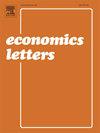气候政策的不确定性会损害还是提高企业投资效率?
IF 2.1
4区 经济学
Q2 ECONOMICS
引用次数: 0
摘要
气候政策不确定性(CPU)影响广泛,一直是一个热门话题,但其对企业投资效率的影响却值得商榷。基于中国上市公司的样本,我们发现,CPU 越高,投资水平越低,而对投资机会的敏感度越高。这表明,CPU 可以促使企业减少投资支出,使其投资决策更加符合投资机会,从而提高投资效率。我们将这一发现命名为CPU的反推效应,并发现这一效应在投资过度或财务状况紧张的企业中更为明显。本文章由计算机程序翻译,如有差异,请以英文原文为准。
Does climate policy uncertainty impair or improve corporate investment efficiency?
Climate policy uncertainty (CPU) has been a topical issue given its widespread impacts, but its effect on corporate investment efficiency is arguable. Based on a sample of Chinese listed firms, we find that higher CPU results in lower investment levels while higher investment sensitivity to investment opportunities. This suggests that CPU improves investment efficiency by pushing firms to reduce investment expenditures and align their investment decisions more in line with investment opportunities. We name this finding as the pushback effect of CPU and find that it is more pronounced for firms with overinvestment or tight financial conditions.
求助全文
通过发布文献求助,成功后即可免费获取论文全文。
去求助
来源期刊

Economics Letters
ECONOMICS-
CiteScore
3.20
自引率
5.00%
发文量
348
审稿时长
30 days
期刊介绍:
Many economists today are concerned by the proliferation of journals and the concomitant labyrinth of research to be conquered in order to reach the specific information they require. To combat this tendency, Economics Letters has been conceived and designed outside the realm of the traditional economics journal. As a Letters Journal, it consists of concise communications (letters) that provide a means of rapid and efficient dissemination of new results, models and methods in all fields of economic research.
 求助内容:
求助内容: 应助结果提醒方式:
应助结果提醒方式:


